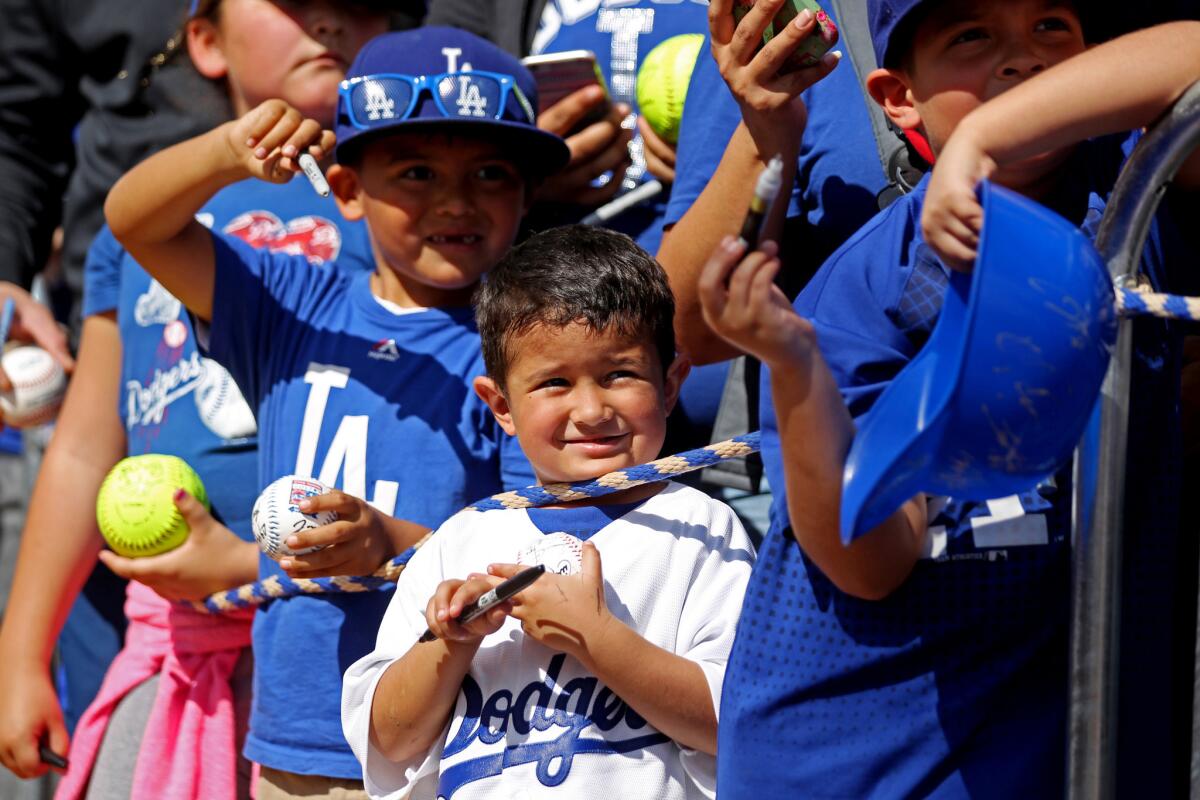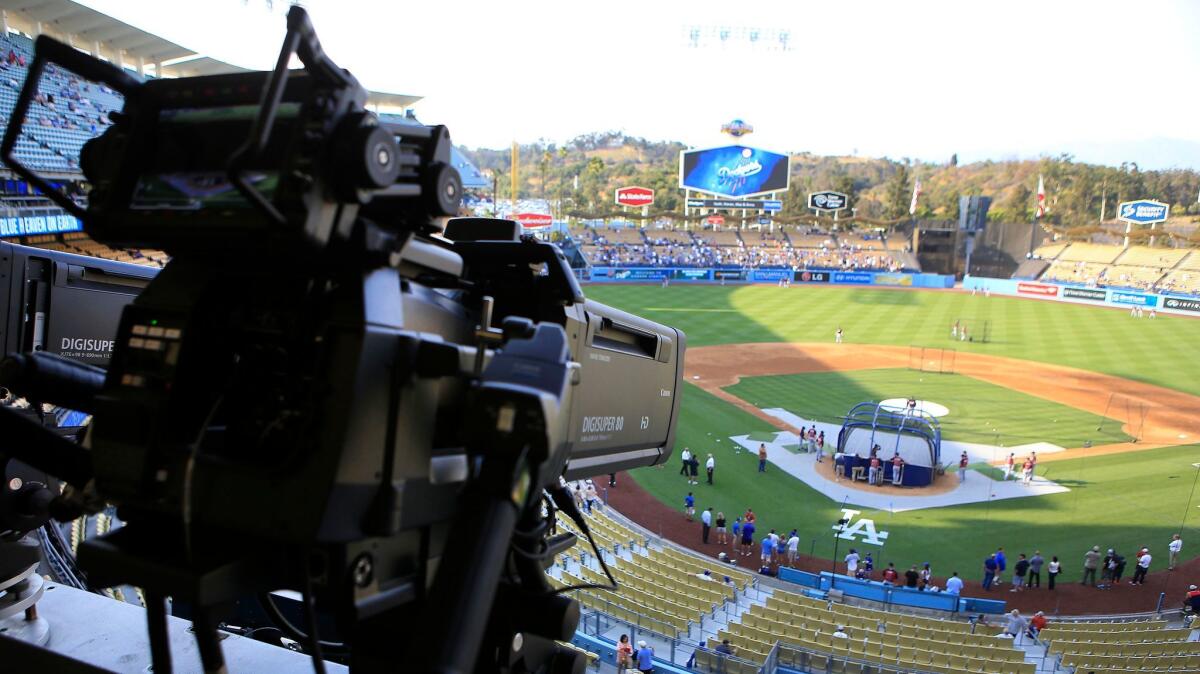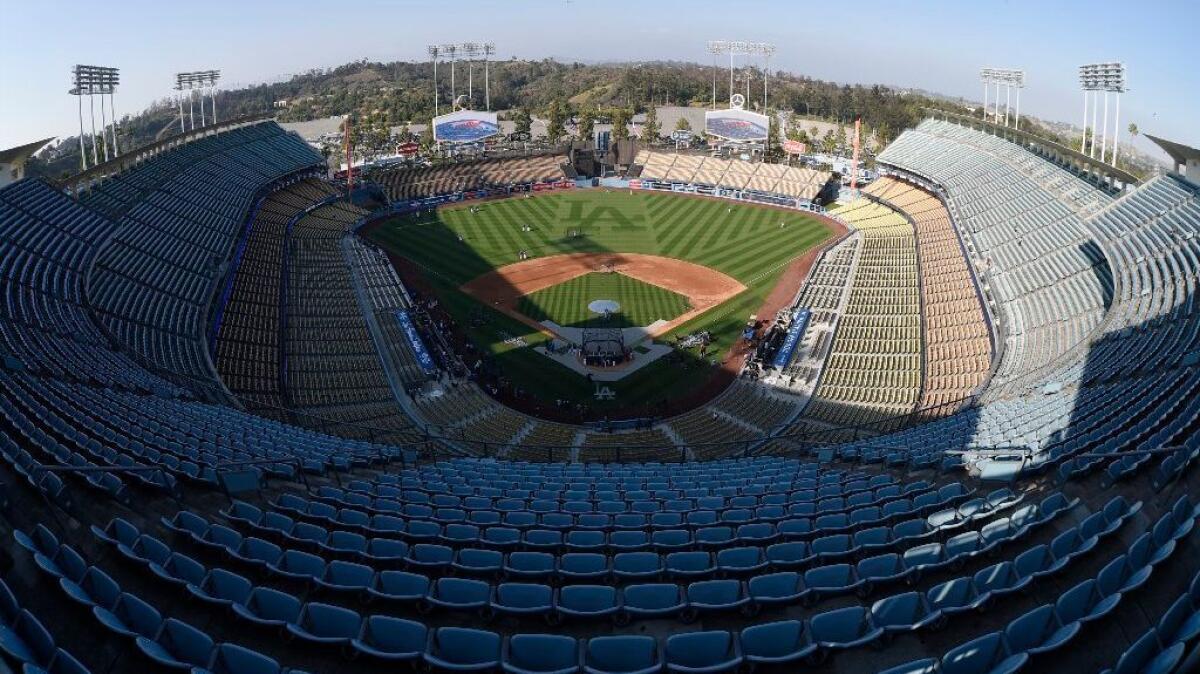Dodgers trying to connect with next generation of fans despite lack of TV exposure

Five years ago, the Dodgers were on their way out of bankruptcy court. On Saturday, they dedicated a statue of Jackie Robinson.
In the five years since Guggenheim Baseball Management replaced Frank McCourt as the Dodgers’ owner, the team has reclaimed much of its glory. Yet that first World Series since 1988 is not the only challenge ahead, as the Dodgers work to lure young fans in a sport struggling to attract them.
The Dodgers’ owners have invested more than $1.5 billion in player salaries, luxury taxes, a management team of unprecedented depth and scope, worldwide scouting and stadium renovations, in the process fielding the highest payrolls in the sport’s history while running the team at a deficit.
Although a championship has remained elusive, the Dodgers are the only team in the major leagues to make the playoffs in each of the last four years, and they have led the majors in attendance in each of those years as well.
Commissioner Rob Manfred’s push to accelerate the pace and increase the action in major league games is rooted in the urgency to attract a new generation of fans, in an era when competition extends beyond other sports to an ever-expanding world of digital entertainment.
The Dodgers face a steeper climb in that the face-value price of their cheapest Sunday ticket is $21, their television broadcasts are blacked out among a majority of their fans, and even the fans who pay to get the telecasts cannot watch them on a computer or smartphone. In addition, the Dodgers now must sell their team in an already crowded sports market joined last year by the Rams, this year by the Chargers and next year by the soccer club LAFC.
“The Dodgers have got the legacy. They’ve got the history. They’ve got the championships,” said Bob Wagner, an industry consultant, former chief marketing officer of the Ducks and former vice president of advertising for the Angels.
“But it’s changed so dramatically from when it was, ‘Just win, baby, and they will come.’ ”
The strongest brand loyalties are built at the youngest ages. The Dodgers engage the community in part by building youth baseball and softball fields, holding clinics for players and coaches and lending support to youth programs in such areas as literacy, vision testing, study skills and nutrition.
“We’re not trying to sell tickets when we do this,” said Erik Braverman, the Dodgers’ vice president of marketing, communications and broadcasting. “We’re doing it because it’s the right thing to do. And we’re trying to connect, hopefully, with kids that might be with us for a lifetime.”
Manfred said the two biggest factors in whether you become a lifelong baseball fan, according to research, are whether you played the sport as a kid and the age at which you first attended a game.
“All of the stuff that we do out in the community really doesn’t mean anything if we don’t connect the dots,” Braverman said, “and that is to bring the experience to Dodger Stadium.”
That is not solely about selling tickets — the Dodgers distributed more than 50,000 free tickets last season to underprivileged youth and community groups, spokesman Steve Brener said — but the vitality of any business depends upon replenishing the base of paying customers.
Not to have the exposure to your product on television in a market of 20 million people? Every one of their games should be on TV.
— Bob Wagner, marketing industry consultant

The Dodgers do not have the highest average ticket price in baseball, but their $21 minimum on Sunday — baseball’s traditional family day — is the highest in the majors. That would require $134 for a family to buy four tickets in advance and four hot dogs and four sodas at the game. The Angels offer that package for $44, for almost half their games.
“Anaheim is probably as good as anybody we have on this front,” Manfred said. He added that he could not comment on the Dodgers’ family pricing or programs because he had not reviewed them.
The Dodgers, like almost all teams, invite youngsters to join a kids’ club. Most teams charge a modest fee and include game tickets, to introduce children to the excitement of the ballpark. The Dodgers’ club is free to join but does not include game tickets, although Braverman said a club package that includes tickets is under consideration.
A previous generation of Dodgers fans was raised on the Dodger-Pepsi Fan Club, with tickets included. As a boy growing up in Houston, Braverman said, he got game tickets through a kids’ club whose name he remembers to this day: Astro Buddies.
“I’m a 47-year-old man now,” Braverman said, “but I can still recall being a 5-, 6- and 7-year old kid and being a member of those programs.”
Braverman said the Dodgers’ ticket prices represent “the best value in town, from a sporting standpoint,” particularly compared to NBA and NFL competition perceived to be more effective in reaching the younger generation.
When he worked for the Angels, Wagner said, the team conducted a study to determine which factors most swayed fans to attend a game. Whether the prices were perceived as fair was more important than whether the team was competitive, a consideration he said the Dodgers might find as well.
“You can’t price yourself out of the market where only the elite get to go,” he said, “and where they’re not on TV.”
For the fourth consecutive year, the cable company that markets the Dodgers-owned SportsNet LA channel has been unable to sell it to any other major cable or satellite provider in the Los Angeles area. The Dodgers got a record $8.35 billion in their 25-year cable deal, but there is no end in sight to the blackout.
“They’re pushing all the right buttons, but that TV contract has just been a killer,” Wagner said. “It’s hurt the team. It didn’t hurt them financially.
“It’s one thing to take care of 45,000 or 50,000 people a night. But, with how well they play and with all the improvements they have made, not to have the exposure to your product on television in a market of 20 million people? Every one of their games should be on TV.
“They’re trying as hard as they can. But it’s hard to believe it’s taken this long without having that worked out.”
The Dodgers also are one of three teams — the Baltimore Orioles and Washington Nationals are the others — whose television broadcasts are not streamed in their local market.
Braverman said he could not say how four years of young fans watching Mike Trout on TV instead of Clayton Kershaw might have hampered the development of the Dodgers’ fan base. Instead, his department is working to connect with young fans on social media, with interactive content and behind-the-scenes programming unavailable to previous generations.

That turns the conversation back to affordability, said Andy Dolich, a consultant and former top business executive for the Oakland Athletics, San Francisco 49ers and Golden State Warriors.
“When you walk into the park, that is indented on you forever,” Dolich said. “If we get to a point where that is all done digitally, then you’ve lost the DNA of what the experience is. And you lose the DNA of connectivity: my grandfather took my mom and dad, my mom and dad have taken me and my sister, my Little League is going.
“The food, the noise, the great plays — there are so many sensory hits you get at the baseball game that, no matter how good the virtual reality is, it’s not the same as being there. There’s nothing, in my view, that takes the place of live experience with your family or friends.”
Dolich said the Dodgers’ history of acquiring international stars to play in a notably diverse city and commitment to replenish that talent pipeline should help the team attract new fans, as baseball becomes a more global sport. A record 29.8% of players on opening day rosters were born outside the U.S., according to the commissioner’s office.
Syracuse sports management professor Rick Burton, former chief marketing officer for the U.S. Olympic Committee and former commissioner of an Australian pro basketball league, said the Dodgers need to balance the short-term incentive to maximize revenue now with the long-term interest of cultivating a young fan base.
The Dodgers have revitalized their player development system with the aim of contending every year rather than trading their best prospects to maximize their chances to win the World Series in any one particular year. They have won four consecutive division championships, for the first time in franchise history.
“You just can’t guarantee that you will win in perpetuity,” Burton said. “If it turns, are you going to be able to get the people back if you don’t have that next generation of fans?”
“At the end of the day, we’re still running a business,” Braverman said. “But, if this brand is going to continue to be viable and be one of the industry leaders for decades to come, I think there is no program more important, at least to me, than working on our kids initiatives.”
Follow Bill Shaikin on Twitter @BillShaikin
More to Read
Go beyond the scoreboard
Get the latest on L.A.'s teams in the daily Sports Report newsletter.
You may occasionally receive promotional content from the Los Angeles Times.











